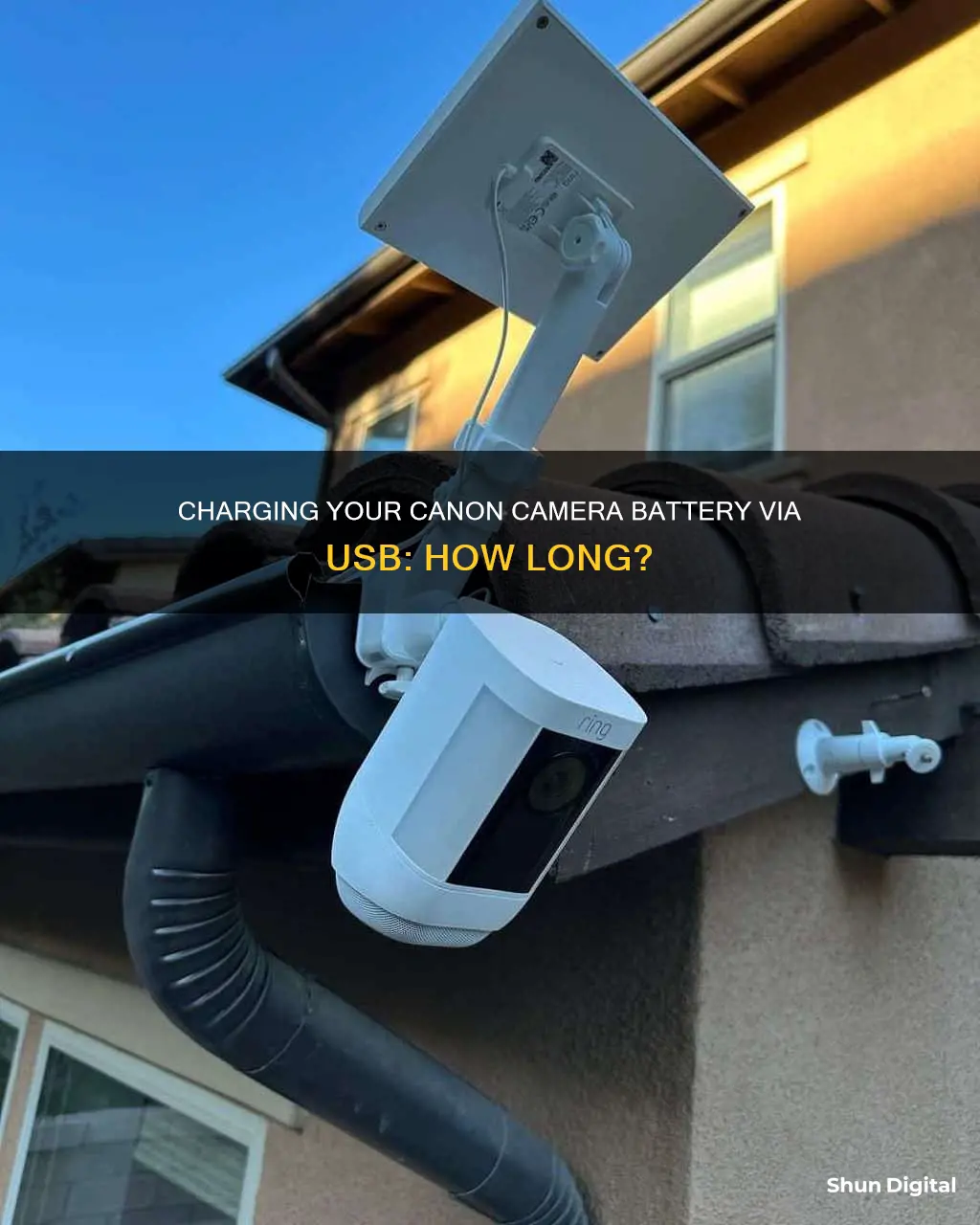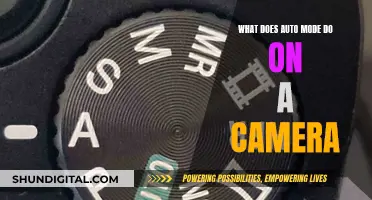
The time it takes to charge a Canon camera battery depends on several factors, including the model of the battery, the recharge performance, the remaining battery capacity, and the ambient temperature. For example, to fully charge an exhausted Canon LP-E6N battery at room temperature (23°C/73°F) using a Canon LC-E6 or LC-E6E charger, it takes about 2 hours and 10 minutes. However, charging the same battery with a Canon PD-E1 USB power adapter takes about 2 hours and 59 minutes. Additionally, charging in low temperatures (below 10°C/50°F) can take up to 4 hours due to safety precautions.
What You'll Learn

Charging a Canon camera battery via USB
Step-by-Step Guide to USB Charging:
- Prepare the Battery: Start by removing any protective covers from the battery and your camera. Insert the battery into the camera, ensuring it is locked securely in the correct orientation.
- Connect the USB Cable: With the camera turned off, open the digital terminal cover. Take the included interface cable and insert the smaller plug into the camera terminal as indicated by the arrows.
- Power Source Options: You have two options for the power source:
- Compact Power Adapter: Use the CA-DC30 or CA-DC30E model. Flip out the plug and connect it directly to a power outlet, or use the power cord with the adapter for outlets that require it.
- Computer: Simply connect the larger plug from the interface cable into one of your computer's USB terminals.
- Charging Begins: Once you've made the connections, the charging process will start automatically. The USB charge lamp will light up to indicate that charging is in progress.
- Charging Complete: When the battery is fully charged, the lamp will turn off. Now you can disconnect the USB cable and close the digital terminal cover.
Additional Tips and Information:
- Charging Time: The time required to fully charge your Canon camera battery via USB will vary depending on several factors, including the ambient temperature and the battery's remaining capacity. Typically, it takes approximately 2 hours to fully recharge a completely exhausted battery at room temperature (around 23°C/73°F).
- Low-Temperature Charging: Charging in lower temperatures, such as between 6°C-10°C/43°F-50°F, will result in longer charging times, up to 4 hours.
- Battery Capacity and Charging: If your battery still has a significant charge (around 94% or higher), it may not charge at all, so always check the battery level before initiating the charging process.
- Optimal Battery Conditions: To maintain optimal battery health, avoid continuously charging your battery for more than 24 hours. It is recommended to charge your battery on the day of use or the day before to ensure a full charge.
- Using Non-Canon Accessories: While it is possible to use third-party accessories, Canon recommends using only genuine Canon battery packs and accessories to ensure compatibility and safety.
By following these instructions and keeping the additional tips in mind, you can effectively and safely charge your Canon camera battery via USB, ensuring you're ready to capture all the moments that matter.
Charging Kidamento Cameras: A Quick Guide
You may want to see also

Charging times vary with temperature
When it comes to charging your Canon camera battery via USB, it's important to understand that charging times can vary depending on the ambient temperature. This is true for both the charging environment and the battery's temperature. Let's delve into the details and explore how temperature variations influence charging times.
Firstly, it is recommended to charge your Canon camera battery in temperatures ranging from 10°C to 30°C (50°F to 86°F). If the ambient temperature or the battery's temperature deviates from this range, the charging process may not initiate. Specifically, if the temperature falls below 0°C (32°F) or exceeds 40°C (104°F), charging will not commence. Therefore, it is crucial to ensure that both the charging environment and the battery are within the optimal temperature range.
The impact of temperature on charging times becomes more pronounced when dealing with lower temperatures. Charging in low-temperature environments, such as 5°C to 10°C (41°F to 50°F), can significantly increase the charging duration. In some cases, it may take up to four hours to fully charge a depleted battery at these lower temperatures. This extended charging time is implemented for safety reasons, as charging batteries at low temperatures can be risky.
On the other hand, higher temperatures can also affect charging times, albeit in a less extreme manner. While it won't take four hours, charging at slightly higher temperatures, such as 23°C (73°F), will generally be faster than charging at the lower end of the recommended temperature range. For example, charging an exhausted Canon LP-E6N battery at 23°C (73°F) takes approximately 2 hours and 10 minutes, whereas charging at a slightly higher temperature of 26°C (78°F) reduces the time to 2 hours and 8 minutes.
However, it is important to note that high-temperature charging can adversely affect the battery's cycle life and reduce its charging capacity. If a battery or camera is left in a hot car on a sunny day, it can experience excessive heating, leading to a false indication of being fully charged when it is not. This results in reduced usable capacity and shorter battery life, necessitating more frequent charging and ultimately lowering the battery's life expectancy.
In summary, when charging your Canon camera battery via USB, it is essential to be mindful of the ambient temperature and the battery's temperature. Charging within the recommended temperature range of 10°C to 30°C (50°F to 86°F) is ideal for optimal charging times and battery health. Deviating from this range, especially towards lower temperatures, can result in significantly longer charging durations, while high-temperature charging can negatively impact the battery's performance and longevity.
Is Your Eufy Camera Charging? Check This Way
You may want to see also

Charging times depend on battery model
The charging time for a Canon camera battery depends on several factors, including the battery model, the recharge performance, and the ambient temperature.
Let's take a closer look at how the battery model affects charging times. The Canon LP-E6 series of batteries, for instance, offers varying charging times due to differences in maximum capacity. The LP-E6N battery, with a capacity of 1865mAh, provides only a slight improvement over the original LP-E6 battery. Consequently, their charging times are quite similar. On the other hand, the LP-E6NH battery, with an 18% improvement in capacity over the LP-E6, takes significantly longer to charge. At room temperature (23°C/73°F), the LP-E6NH battery requires 2 hours and 47 minutes to fully charge, while the LP-E6 and LP-E6N batteries take approximately 2 hours and 2 hours and 10 minutes, respectively.
It's worth noting that charging times are not solely dependent on the battery model. The method of charging can also make a difference. For instance, charging an LP-E6NH battery inside an EOS R6 camera with a USB power adapter at room temperature takes about 2 hours and 59 minutes, which is slightly longer than using Canon's dedicated LC-E6 or LC-E6E battery charger.
In addition, the age and condition of the battery can influence charging times. As Lithium-ion batteries age, their recharge performance decreases, and this can be monitored through the Battery Info page on a Canon EOS camera. The recharge performance is influenced by factors such as the number of recharge cycles and the recharge conditions, including temperature. Older batteries with higher internal resistance may require longer charging times to reach a full charge.
To summarize, the charging time for a Canon camera battery is influenced by various factors, with the battery model being a significant contributor. The differences in battery capacity among models lead to variations in charging times, with higher-capacity batteries generally taking longer to charge. However, it's important to consider other factors as well, such as the chosen charging method and the battery's age and condition, to get a comprehensive understanding of the charging time for a specific Canon camera battery model.
Is Your Webbie HD Camera Charging?
You may want to see also

Charging times depend on battery's recharge performance
The charging time for a Canon camera battery depends on several factors, including the model of the battery, its remaining capacity, and the ambient temperature. However, the recharge performance of the battery is also a critical factor that influences the charging time.
As Lithium-ion batteries age, their recharge performance decreases. The recharge performance is influenced by the number of recharge cycles and the conditions under which the battery is recharged, such as the temperature. The degradation of older Lithium-ion batteries is caused by a steady increase in the internal resistance of the battery. This increased internal resistance may require longer charging times for older batteries to be fully charged.
The recharge performance of a Canon EOS Li-ion battery can be monitored through the Battery Info page in the camera menu. By keeping track of the recharge performance, users can gain insights into the potential charging time required for their battery.
Additionally, it is important to note that charging a battery at extremely low temperatures can take significantly longer. Canon recommends charging batteries at room temperature, ideally between 50°F and 86°F (10°C and 30°C), with an optimal range of 68°F-78°F (20°C-26°C). Charging at low temperatures, such as below 43°F (6°C), can increase the charging time to up to 4 hours.
In summary, the charging time for a Canon camera battery is influenced by various factors, and the recharge performance of the battery plays a significant role. Monitoring the recharge performance through the camera menu can help users anticipate and manage their battery charging times effectively.
Charging Camera: Plugging into Computer, What's the Deal?
You may want to see also

Charging times depend on remaining battery capacity
The time it takes to charge a Canon camera battery depends on several factors, including the remaining battery capacity, the type of battery, and the method of charging. Let's delve into the details:
When a Canon camera battery is fully depleted, it will take longer to charge than if it still has some power left. For example, the LP-E6 battery takes approximately 2 hours to charge from empty, while the LP-E6N and LP-E6NH batteries take 2 hours and 10 minutes, and 2 hours and 47 minutes, respectively. However, if your battery still has some power left, the charging time will be shorter. It's important to note that Lithium-ion batteries should not be completely discharged, as this can cause permanent damage. Canon recommends charging your camera battery when it reaches a remaining capacity of 10-20% to ensure maximum use and avoid any potential complications.
The remaining battery capacity also influences charging time because if the capacity is at 94% or higher, the battery won't charge at all. So, if you're waiting for the battery to reach a full charge, you might be waiting a long time. This is because a lithium-ion battery that appears "exhausted" may still have around 10% capacity remaining. Therefore, if you're recharging an LP-E6 series battery with a remaining capacity between 10% and 94%, the charging time will depend on the starting capacity.
The method of charging affects LP-E6 battery charging times
The way you choose to charge your Canon camera battery can also impact the charging time. While a standard Canon LC-E6 or LC-E6E battery charger is typically included with your camera, there are alternative options available, such as third-party chargers or USB charging. For example, charging an LP-E6NH battery inside an EOS R6 with the Canon PD-E1 USB power adapter takes approximately 2 hours and 59 minutes, which is slightly longer than using the standard Canon charger.
Charging Your SimpliSafe Outdoor Camera: A Quick Guide
You may want to see also
Frequently asked questions
It takes approximately 2 hours to fully recharge a completely exhausted Canon camera battery at room temperature (23°C/73°F) using a USB cable.
The charging time varies depending on the ambient temperature and the battery's remaining capacity. Low temperatures can increase the charging time by up to 4 hours.
It is recommended to charge the battery in temperatures between 10°C and 30°C (50°F and 86°F). Charging may not start if the temperature is outside the range of 0°C to 40°C (32°F to 104°F).
It is not recommended to charge the battery continuously for more than 24 hours. Always remove the battery from the charger once it is fully charged.
When the battery is fully charged, the charge lamp will turn green, or the USB charge lamp will turn off.







